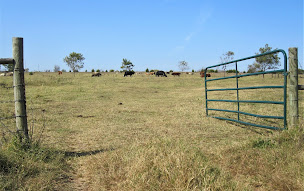This summer, one of the 2020 calves, an adventuresome white steer, insisted on getting into the trap. Numerous times, I walked down with my extraordinarily long sticks (basically long skinny limbs) that extend my short arms. Slowly veering widely around the delinquent calf, I quietly unlatched the gate carefully opening the gate widely. Then I moved stealthily, gently influencing the errant little Charolais mix, with a soft, calm voice assuring him, using my long sticks to guide him to the open gate. In seconds, the white bovine ran to join the rest of the herd.
 |
| The Preferred "Broad" Way for the White Steer |
As I approached the wide-opened
gate, lifting it back to the gate post and latched it, the wide-opening caused
me to remember the somber words of Jesus from Matthew 7:13-14:
“Enter by the narrow gate; for wide is the gate and
broad is the way that leads to destruction, and there are many who go in by it.
Because narrow is the gate and difficult is the way
which leads to life, and there are few who find it.”
I recalled a previous time with this same wayward calf and a narrow opening. Getting him out through that opening was unsuccessful. What a grave illustration of the words of Jesus describing the two choices for each human!
 |
| The "Narrow" Way |
More than any time in the
history of mankind, the gate to destruction appears an enormously broad
expanse, such an enormous opening that can hardly be avoided. Ruinous behavior,
influences and activities seem to drive, propel, prod, and coerce mankind
through the wide gate that Jesus warned to avoid. Most deceptive of this broad
way is the enormity of people who crowd every inch of it leading to the
thought, Surely all these people can’t be wrong. King Solomon wrote of
the hazard of the broad road in Proverbs 14:12 – There is a way that seems
right to a man, But its end is the way of death.
My memory of the unsuccessful
movement of the little white steer through narrow gate opening reminded me of his
difficulty locating the small gap. His peripheral vision made it seem too
restrictive for him. This must be unsafe, must be a trap. Much like the unruly
steer, humans react negatively to Jesus being the only way to life, heaven, and
contentment. It appears constrictive, limiting one’s creativity, and
stifling to happiness.
Yet countless people from my
past have responded to the call of the Lord by following Him on the narrow road
with intrinsic and eternal rewards. King Solomon of Israel also wrote of the
only way of salvation through Jesus in Proverbs 15:24 – The way of life
winds upward for the wise, That he may turn away from hell below.
As I revisited this memory of the feisty steer’s persistence, the thought surfaced of our own waywardness from God. The only solution required Jesus "humble Himself" by taking on a human body, enter our world and give His life on the cross thus making salvation possible "for as many as received Him."
Finally, I recalled one of Billy Graham’s favorite hymns entitled And Can It Be? written by Charles Wesley almost 300 years ago. A couple of lines persisted in my mind. May these words encourage you if you are on the narrow road. If you are still on the broad road, may you respond to the call of Jesus to go through Him, the narrow gate, and follow Him on the narrow road to heaven.






